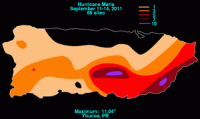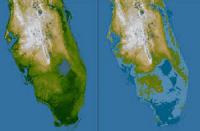-
The fundamental challenges of living with wildfire
Wildfires can have dramatic impacts on Western landscapes and communities, but human values determine whether the changes caused by fire are desired or dreaded. This is the simple - but often overlooked - message from a collaborative team of researchers.
-
-
As floods increase, cities like Detroit are looking to green stormwater infrastructure
Urban sprawl meant paving over grasslands and wetlands, making it so water is unable to soak into the ground. Today, that impervious development, coupled with the more intense storms brought by climate change, is making flooding a major issue for many cities. Urban areas are looking for better ways to manage runoff.
-
-
Carbon dioxide levels in the atmosphere highest in human history
Atmospheric levels of planet-warming carbon dioxide have hit a record high of more than 415 parts per million. Before the Industrial Revolution in the nineteenth century, carbon dioxide levels fluctuated but never exceeded 300 ppm at any one time over the past 800,000 years. Carbon dioxide levels in the atmosphere broke 400 ppm for the first time in human history in 2013.
-
-
As planet warms, even little precipitation may disrupt road networks
A new computer model shows that as more rain falls on a warming planet, it may not take a downpour to cause widespread disruption of road networks. The model combined data on road networks with the hills and valleys of topography to reveal “tipping points” at which even small localized increases in rain cause widespread road outages.
-
-
Extreme floods associated with distinct atmospheric patterns
Extreme floods across the continental United States are associated with four broad atmospheric patterns, a machine-learning based analysis of extreme floods found.
-
-
Maths shows the nature of “tipping points” for climate, eco crises
Humans need to be wary of breaching a “point of no return” that leads to ecological disaster such as loss of rainforests or irreversible climate change, according to the most detailed study of its kind.
-
-
Forest fires accelerating snowmelt across western U.S., affecting water supplies
Forest fires are causing snow to melt earlier in the season, a trend occurring across the western U.S. that may affect water supplies and trigger even more fires, according to a new study. It is a cycle that will only be exacerbated as the frequency, duration, and severity of forest fires increase with a warmer and drier climate.
-
-
Mozambique hit by another unprecedented tropical cyclone
A few weeks after Cyclone Idai which wreaked havoc on central Mozambique (and eastern Zimbabwe), the country is dealing with another unprecedented event. Tropical Cyclone Kenneth made landfall in northern Mozambique on 25 April, near the border with Tanzania, in an area where no tropical cyclone has been observed since the satellite era. There is no record of two storms of such intensity striking Mozambique in the same season. It has now weakened into a depression.
-
-
California: Coastal impacts of climate change
The United States Geological Survey (USGS) says that sea-level rise is going to wreak widespread destruction on California’s coastal communities, unless these communities take urgent action to mitigate to risks. “Even the storms today have significant risk to California’s coastline,” said Patrick Barnard, the lead author of the study. “There are about $12 billion in properties that are at risk of extreme storm today, but if you look out into the future, let’s say mid-century, those numbers roughly triple to about $30 billion of property at risk with just a little bit of sea level rise, and it goes up from there,” USGS researchers Patrick L. Barnard and colleagues write in Scientific Reports.
-
-
Hurricane Maria's extreme rainfall due mostly to human-caused climate change

Hurricane Maria dropped more rain on Puerto Rico than any storm to hit the island since 1956, a feat due mostly to the effects of human-caused climate warming, new research finds.
-
-
Climate change: Our greatest national security threat?
The climate century is here: the earth is warming, humans are to blame, and we must take immediate action now to prepare for climate change’s massively disruptive consequences. Mark Nevitt writes in Just Security that No longer can climate change be categorized solely as an environmental issue—it is a grave threat to national security. Indeed, it may be the threat. While there are many national security challenges facing the nation and the world, climate change is an aptly described “super wicked” problem that exacerbates and accelerates already existing threats.
-
-
Why the Great Plains has such epic weather
From 78 degrees on Tuesday to snow on Wednesday? Swings like this aren’t unusual in the central United States, where weather can quickly shift from one extreme to another. What generates such “big weather” on the Great Plains?
-
-
Preparing San Francisco for future storms
The San Francisco Bay Area has been pummeled this winter by storms packed with moisture from atmospheric rivers. San Francisco is partnering with the Berkeley Lab to assess how climate change may influence the intensity of atmospheric rivers and associated precipitation, and how those changes may impact San Francisco and its infrastructure.
-
-
Stern warning: Climate expert emphasizes the fierce urgency of now

Prominent economist and policymaker Lord Nicholas Stern delivered a strong warning about the dangers of climate change in a talk at MIT on Tuesday, calling the near future “defining” and urging a rapid overhaul of the economy to reach net zero carbon emissions. “The next 20 years will be absolutely defining,” Stern told the audience, saying they “will shape what kind of future people your age will have.”
-
-
For a flooded Midwest, climate forecasts offer little comfort
Floods are triggered by extreme rainfall events, often combined with ground conditions, such as saturated or frozen ground, that make it harder for water to percolate down into soil, which increases runoff. Global warming has the potential to intensify the Earth’s water cycle, which will alter the quantity, frequency, intensity and duration of rain and snowfall. As my research and work by others has shown, all of these changes raise the risk of floods for Midwest states.
-
- All
- Regional
- Water
- Biometrics
- Borders/Immig
- Business
- Cybersecurity
- Detection
- Disasters
- Government
- Infrastructure
- International
- Public health
- Public Safety
- Communication interoperabillity
- Emergency services
- Emergency medical services
- Fire
- First response
- IEDs
- Law Enforcement
- Law Enforcement Technology
- Military technology
- Nonlethal weapons
- Nuclear weapons
- Personal protection equipment
- Police
- Notification /alert systems
- Situational awareness
- Weapons systems
- Sci-Tech
- Sector Reports
- Surveillance
- Transportation
Advertising & Marketing: advertise@newswirepubs.com
Editorial: editor@newswirepubs.com
General: info@newswirepubs.com
2010-2011 © News Wire Publications, LLC News Wire Publications, LLC
220 Old Country Road | Suite 200 | Mineola | New York | 11501
Permissions and Policies
Editorial: editor@newswirepubs.com
General: info@newswirepubs.com
2010-2011 © News Wire Publications, LLC News Wire Publications, LLC
220 Old Country Road | Suite 200 | Mineola | New York | 11501
Permissions and Policies
